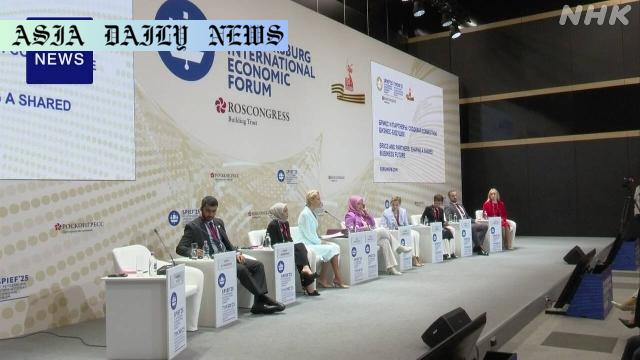Economic Forum kicks off in St. Petersburg with a focus on strengthening ties with non-Western countries amidst sanctions.
140 countries participate in St. Petersburg Economic Forum.
Russia focuses on non-Western countries amid sanctions.
BRICS ties are emphasized to challenge trade restrictions.
Western participation is significantly reduced due to Ukraine conflict.

Introduction: A New Chapter in Economic Diplomacy
The St. Petersburg International Economic Forum (SPIEF) began on Wednesday, signaling Russia’s latest attempt to bolster its global economic presence amidst challenging geopolitical conditions. With representatives from 140 countries and territories attending this prestigious four-day event, SPIEF aims to counteract the isolation brought forth by ongoing sanctions imposed by Western nations. This forum places a spotlight on collaboration with non-Western nations, particularly in Asia, the Middle East, and South America. The strategic focus reflects a changing global landscape wherein Russia seeks to thrive without relying on the traditional economic powers of the West.
Global Participation: 140 Countries in Focus
This year’s SPIEF stands out with a wide-ranging global roster of participants. Despite geopolitical tensions, attendees from countries such as China, India, and others in Southeast Asia have underscored their commitment to deepening economic ties. Booths set by Russian firms and international organizations saw significant crowds, showcasing innovation, business prospects, and the opportunities for robust trade mechanisms outside of Western spheres. Economies including BRICS nations see this forum as a chance to expand upon frameworks that prioritize shared success and multilateral cooperation, redefining global trade paradigms.
Sanctions and Western Absence
This year marks a notable shift in attendance patterns, as delegates from Western nations, particularly G7 countries, have largely abstained due to Russia’s ongoing conflict with Ukraine. The absence of Western voices creates a unique dynamic at this year’s SPIEF. However, the forum seeks to leverage this opportunity to foster stronger relations among non-aligned and emerging economies such as those in the Middle East and South America. By showcasing a collective economic front, these regions aspire to counterbalance sanctions and the diminishing reliance on the Western economies.
BRICS and Non-Western Collaborations
Prominent sessions at SPIEF brought the BRICS framework into sharper focus. Delegates heavily emphasized the importance of creating alternative financial and economic structures to bypass sanctions and foster mutual development. The BRICS nations, encompassing Brazil, Russia, India, China, and South Africa, reiterated shared goals of independence from Western-dominated financial systems. This strategy holds potential for reshaping global economic policies, allowing emerging nations to assert a stronger position on the international stage.
Anticipated Speech from Putin
A high-stakes moment for the forum will undoubtedly be Russian President Vladimir Putin’s speech on Friday. It is widely expected that Putin will use the platform to counter Western narratives while promoting stronger multilateral bonds with non-Western allies. His address is likely to highlight sanctions as an opportunity for innovation, resilience, and strengthened alliances. The speech is expected to also underscore Russia’s strategies to remain a formidable player in global trade, despite mounting challenges from Western policies.
Conclusion
The St. Petersburg International Economic Forum serves as a powerful symbol of Russia’s determination to reimagine its role in the global economy amidst adversities. As the forum unfolds, the emphasis on BRICS alliances and engagement with 140 participating nations reaffirms that vibrant economic possibilities remain even in times of political upheaval. The outcomes of this high-profile gathering will define not only Russia’s future economic trajectory but also the evolution of global trade dynamics as power increasingly shifts toward non-Western nations.



Commentary
Reflection on SPIEF and Russia’s Global Economic Strategy
The annual St. Petersburg International Economic Forum exemplifies Russia’s ambition to reposition itself within an evolving global economic framework. This year’s event sheds light on how international relations are recalibrating in the face of Western-imposed sanctions and ongoing geopolitical tensions. The strong attendance from countries like China, India, and regions such as Southeast Asia showcases the growing clout of emerging economies in shaping the trajectory of global trade.
What stands out is the forum’s focus on fostering alliances beyond traditional Western partnerships. This strategic pivot mirrors the global South’s growing influence and a symbolic rejection of dependency on Western economies. By collaborating with BRICS nations, Russia and its allies demonstrate a steadfast commitment to forging a financial ecosystem that challenges the monopoly of Western institutions.
However, the absence of Western nations cannot be overlooked. While it opens doors to greater cohesion among non-Western participants, the lack of diverse perspectives risks creating an economic bloc primarily focused on resistance rather than collaboration. The themes emerging from this forum will undoubtedly shape discussions at a broader global economic level.
As Russian President Vladimir Putin prepares to address attendees, all ears will be on how Russia positions itself amid Western isolation. Will his speech instill confidence in Russia’s resilience, or will it deepen current divides? As these developments unfold, this forum offers us a rare glimpse into the emerging redefinition of global economic power structures. The next steps will determine if this rhetoric translates into tangible policy shifts that can genuinely counterbalance Western economic influence.